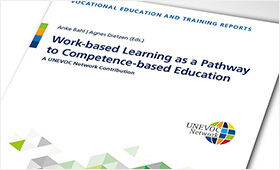Work-based learning as a pathway to competence-based education
18.04.2019
With contributions from international experts on vocational education and training, the volume opens up a global perspective on the topic of work-based learning in the context of competence-based education.

Work-based learning (WBL) is recognised around the world as an effective strategy to promote the quality and relevance of vocational education and training. The term WBL refers to all forms of learning that take place in a real work environment. Enhancing the potential of workplaces as learning environments supports individuals in developing the skills needed to successfully obtain and keep jobs. Based on prevailing education and training pathways and traditions, WBL can vary significantly from one country to another. Some of the most common types of WBL are apprenticeships, internships, traineeships and on-the-job training. Oftentimes elements of learning in the workplace are combined with classroom-based learning. Advancing WBL models effectively therefore requires an understanding and adaptation to country-specific contexts and cultural traditions.
In recent times, international organisations and regional actors alike have voiced the necessity of WBL programmes. The 2015 UNESCO recommendation for TVET and the New Skills Agenda by the European Union are two examples. On a policy level, there is consensus that WBL is a crucial factor for productivity and economic growth and eventually for enhancing youth employability. However, for many countries it is difficult to develop and implement high-quality work-based learning systems. Rapid technological change and digitisation create additional challenges, affect the demand for skills and call attention to the topic of lifelong learning.
This book is the result of a collaborative research project led by the Federal Institute for Vocational Education and Training (BIBB), with support of the UNESCO-UNEVOC International Centre for Technical and Vocational Education and Training (TVET). With contributions from international experts on vocational education and training, the publication fosters adopting a global perspective on WBL as a pathway to delivering competence-based education.
Inspired by research evidence from a diversity of recent national projects, the book offers new insights in conducive factors for learning on the level of the individual subject and the work environment. The articles touch upon regional and national challenges in supporting WBL and in developing and implementing curricula based on actual work processes. They take a closer look at the role of tutors in WBL and show new options in the transfer and recognition of knowledge, skills and competences.
The book concludes that work-based learning has the potential to be a key driver of TVET reforms in a lifelong learning perspective and that the engagement of national TVET organisations in international networks as UNESCO’s UNEVOC network helps to draw lasting attention to the role of present and future research about work-based learning.
The volume is available both as print publication and electronic file (open access).